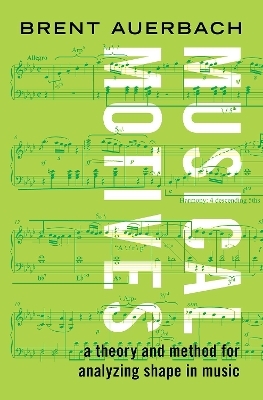
Musical Motives
Oxford University Press Inc (Verlag)
978-0-19-752602-6 (ISBN)
All music fans harbor in their memories vivid fragments of their favorite works. The starting guitar solo of "Satisfaction" by the Rolling Stones, the da-da-da-DUM gesture that opens Beethoven's Fifth Symphony, the lush swelling chords of a beloved movie soundtrack: hearing the briefest snippet of any of these is enough to transport listeners into the piece's sonic and emotional world. But what makes musical motives so powerful? In Musical Motives, author Brent Auerbach looks at the ways that motives — the small-scale pitch and rhythm shapes that are ever-present in music — unify musical compositions and shape our experiences of them.
Motives serve both to communicate basic musical meaning and to tie together sound space like the motifs in visual art. They present in all genres from classical and popular to jazz and world music, making them ideally suited for analysis. Musical Motives opens with a general introduction to these fundamental building blocks, then lays out a comprehensive theory and method to account for music's structure and drama in motivic terms. Aimed at both amateur and expert audiences, the book offers a tiered approach that progresses from Basic to Complex Motivic Analysis. The methods are illustrated by small- and large-scale analyses of pieces by Mozart, Beethoven, Handel, Chaminade, Verdi, Radiohead, and many more.
Brent Auerbach, Associate Professor of Music Theory, University of Massachusetts Amherst Brent Auerbach is Associate Professor of Music Theory at the University of Massachusetts Amherst. His research focuses on formalizing the concept of the musical motive and extending its applications for analysis. Other research interests include the music of Brahms, the aesthetics of Baroque composition and counterpoint, harmonic sequences, and music theory pedagogy. Dr. Auerbach has published articles in The Journal of Music Theory, Music Theory Online, Theory and Practice, Intégral, and in The Routledge Companion to Music Theory Pedagogy, ed. by Leigh VanHandel (2020).
PART I: Establishing Grounds for a Discipline of Motivic Analysis
Chapter 1: Introduction to Motives
Chapter 2: A Brief History of Motives, Composition
Chapter 3: A History of Motives, Theory and Analysis
PART II: Methodology
Chapter 4: A Universal Nomenclature for Pitch and Rhythm Motives
Chapter 5: Basic Motivic Analysis (BMA)
Interlude 1 - On the Role of Narrative in Motivic Analysis in General and Its Role in BMA in Particular
Chapter 6: Exemplars of Basic Motivic Analysis
Interlude 2 - Narrative Archetypes of Complex Motivic Analysis (CMA)
Chapter 7: Complex Motivic Analysis 278
PART III: Analysis and Conclusion
Chapter 8 - Analysis of Three Works in Contrasting Styles
Chapter 9: Conclusion - The Future Promise and Persistent Limitations of Motivic Analysis
Selected Bibliography
Index
| Erscheinungsdatum | 25.01.2021 |
|---|---|
| Zusatzinfo | 192 musical examples |
| Verlagsort | New York |
| Sprache | englisch |
| Maße | 239 x 157 mm |
| Gewicht | 748 g |
| Themenwelt | Kunst / Musik / Theater ► Musik ► Musiktheorie / Musiklehre |
| ISBN-10 | 0-19-752602-0 / 0197526020 |
| ISBN-13 | 978-0-19-752602-6 / 9780197526026 |
| Zustand | Neuware |
| Informationen gemäß Produktsicherheitsverordnung (GPSR) | |
| Haben Sie eine Frage zum Produkt? |
aus dem Bereich


